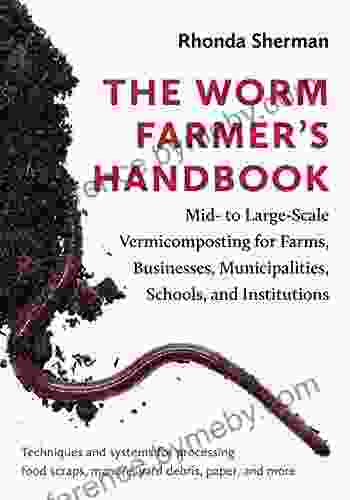Mid To Large Scale Vermicomposting For Farms Businesses Municipalities Schools

Vermicomposting, the process of using worms to break down organic matter into nutrient-rich fertilizer, has emerged as a powerful tool for sustainable waste management and soil enhancement. This comprehensive guide delves into the intricacies of mid to large-scale vermicomposting, providing essential insights for farms, businesses, municipalities, and schools seeking to harness the transformative potential of this eco-friendly practice.
4.7 out of 5
| Language | : | English |
| Text-to-Speech | : | Enabled |
| Enhanced typesetting | : | Enabled |
| File size | : | 115652 KB |
| Print length | : | 239 pages |
| Screen Reader | : | Supported |
Benefits of Vermicomposting
- Reduces environmental impact: Vermicomposting diverts organic waste from landfills and incinerators, significantly reducing greenhouse gas emissions and conserving natural resources.
- Improves soil health: Vermicompost, the end product of vermicomposting, is a nutrient-dense fertilizer that enhances soil structure, water retention, and microbial activity, resulting in healthier plants and increased crop yields.
- Eliminates odors: Unlike traditional composting methods, vermicomposting produces virtually no unpleasant odors, making it an ideal solution for urban areas or facilities where odor control is a concern.
- Educational value: Vermicomposting offers a hands-on learning experience for students and community members, fostering an appreciation for sustainability and environmental stewardship.
Mid to Large-Scale Vermicomposting Systems
Mid to large-scale vermicomposting systems typically consist of multiple interconnected bins or beds, allowing for continuous processing of organic materials. These systems are designed to optimize worm populations, efficiently manage moisture and aeration, and facilitate harvesting of finished vermicompost.
Bin Types
Various types of bins can be used for mid to large-scale vermicomposting, including:
- Plastic bins: Durable and easy to clean, plastic bins are a common choice for both indoor and outdoor use.
- Wooden bins: Constructed from natural materials, wooden bins provide insulation and can be customized to fit specific needs.
- Metal bins: Sturdy and resistant to pests, metal bins are suitable for outdoor applications where durability is a priority.
- Flow-through bins: Designed for continuous processing, flow-through bins allow organic materials to move through the system without manual transfer.
Worm Species
The most common worm species used in vermicomposting is Eisenia fetida, also known as the red wiggler. These worms are highly efficient at breaking down organic matter and producing nutrient-rich vermicompost.
Feedstock Management
The key to successful vermicomposting is providing a balanced diet of organic materials for the worms to consume. Suitable feedstocks include:
- Fruit and vegetable scraps
- Coffee grounds
- Tea bags
- Newspaper and cardboard
- Manure
Operation and Maintenance
Successful operation and maintenance of mid to large-scale vermicomposting systems require careful attention to the following factors:
Moisture and Aeration
Worms require a moist environment, but excessive moisture can lead to anaerobic conditions and worm mortality. Aeration is equally important, as worms breathe through their skin. Proper bin design and regular turning of the compost material ensure optimal moisture and aeration levels.
Temperature
Worms thrive in temperatures between 55°F and 75°F. Temperature control is particularly important in outdoor systems during extreme weather conditions.
pH and Carbon-to-Nitrogen Ratio
The pH of the compost material should be maintained between 6.5 and 7.5. A carbon-to-nitrogen ratio of 30:1 is ideal for optimal worm activity and compost quality.
Harvesting and Processing
Vermicompost is ready to harvest when it is dark and crumbly, with no visible food scraps or worms. Harvesting can be done manually or mechanically, depending on the scale of the operation.
Applications of Vermicompost
Vermicompost has a wide range of applications, including:
- Agriculture: Vermicompost is an excellent soil amendment for farms and gardens, providing essential nutrients and improving soil structure.
- Horticulture: Vermicompost is ideal for container gardening, potting mixes, and raised beds, promoting healthy plant growth and reducing fertilizer requirements.
- Landscaping: Vermicompost can be used to improve the quality of soil in parks, golf courses, and other public spaces.
- Waste management: Vermicomposting can significantly reduce the volume of organic waste sent to landfills, promoting sustainable waste disposal practices.
Mid to large-scale vermicomposting offers a powerful solution for sustainable waste management and soil enhancement. By embracing the natural process of vermicomposting, farms, businesses, municipalities, and schools can unlock the transformative benefits of this eco-friendly practice, reducing their environmental footprint, enhancing soil health, and generating valuable organic fertilizer. This comprehensive guide provides the essential knowledge and insights to establish and manage thriving vermicomposting systems, empowering you to harness the transformative power of nature for a more sustainable future.
4.7 out of 5
| Language | : | English |
| Text-to-Speech | : | Enabled |
| Enhanced typesetting | : | Enabled |
| File size | : | 115652 KB |
| Print length | : | 239 pages |
| Screen Reader | : | Supported |
Do you want to contribute by writing guest posts on this blog?
Please contact us and send us a resume of previous articles that you have written.
 Book
Book Novel
Novel Page
Page Chapter
Chapter Text
Text Story
Story Genre
Genre Reader
Reader Library
Library Paperback
Paperback E-book
E-book Magazine
Magazine Newspaper
Newspaper Paragraph
Paragraph Sentence
Sentence Bookmark
Bookmark Shelf
Shelf Glossary
Glossary Bibliography
Bibliography Foreword
Foreword Preface
Preface Synopsis
Synopsis Annotation
Annotation Footnote
Footnote Manuscript
Manuscript Scroll
Scroll Codex
Codex Tome
Tome Bestseller
Bestseller Classics
Classics Library card
Library card Narrative
Narrative Biography
Biography Autobiography
Autobiography Memoir
Memoir Reference
Reference Encyclopedia
Encyclopedia Alex Blaine Layder
Alex Blaine Layder Akilah S Richards
Akilah S Richards Anthony Chaney
Anthony Chaney Adam Stevenson
Adam Stevenson Richard Lippe
Richard Lippe Afro
Afro Phoenix Nature
Phoenix Nature Albert Jeremiah Beveridge
Albert Jeremiah Beveridge Alan L Gansberg
Alan L Gansberg Walter Rhein
Walter Rhein Alethea Kontis
Alethea Kontis Sidney Huntington
Sidney Huntington Aer Ki Jyr
Aer Ki Jyr Alan Walker
Alan Walker Al Yellon
Al Yellon Ah Monayem
Ah Monayem David J Griffiths
David J Griffiths Alan Philps
Alan Philps Alessandra Hazard
Alessandra Hazard Adrian Forte
Adrian Forte
Light bulbAdvertise smarter! Our strategic ad space ensures maximum exposure. Reserve your spot today!
 Ivan CoxFollow ·9.5k
Ivan CoxFollow ·9.5k Denzel HayesFollow ·6k
Denzel HayesFollow ·6k Yasushi InoueFollow ·13.3k
Yasushi InoueFollow ·13.3k Hugo CoxFollow ·12.6k
Hugo CoxFollow ·12.6k Caleb LongFollow ·19.8k
Caleb LongFollow ·19.8k Ruben CoxFollow ·7.7k
Ruben CoxFollow ·7.7k Ernest ClineFollow ·15.7k
Ernest ClineFollow ·15.7k Dwight BellFollow ·11.9k
Dwight BellFollow ·11.9k

 Brandon Cox
Brandon CoxStronger: Forty Days of Metal and Spirituality
A 40-day...

 Dustin Richardson
Dustin RichardsonDelve into the Gripping World of British Crime: DCI Kett...
Unveiling the Intricate Tapestries of Crime...

 Giovanni Mitchell
Giovanni MitchellTrue Wealth Starts In The Mind: Unleash Your Inner...
In the pursuit of...

 Duncan Cox
Duncan CoxPulse Pounding British Crime Thriller: DCI Kett Crime...
Prepare for...

 Dashawn Hayes
Dashawn HayesUnveiling the Unwavering Strength and Inspiring Journey...
In the annals of wrestling history, the name...
4.7 out of 5
| Language | : | English |
| Text-to-Speech | : | Enabled |
| Enhanced typesetting | : | Enabled |
| File size | : | 115652 KB |
| Print length | : | 239 pages |
| Screen Reader | : | Supported |













